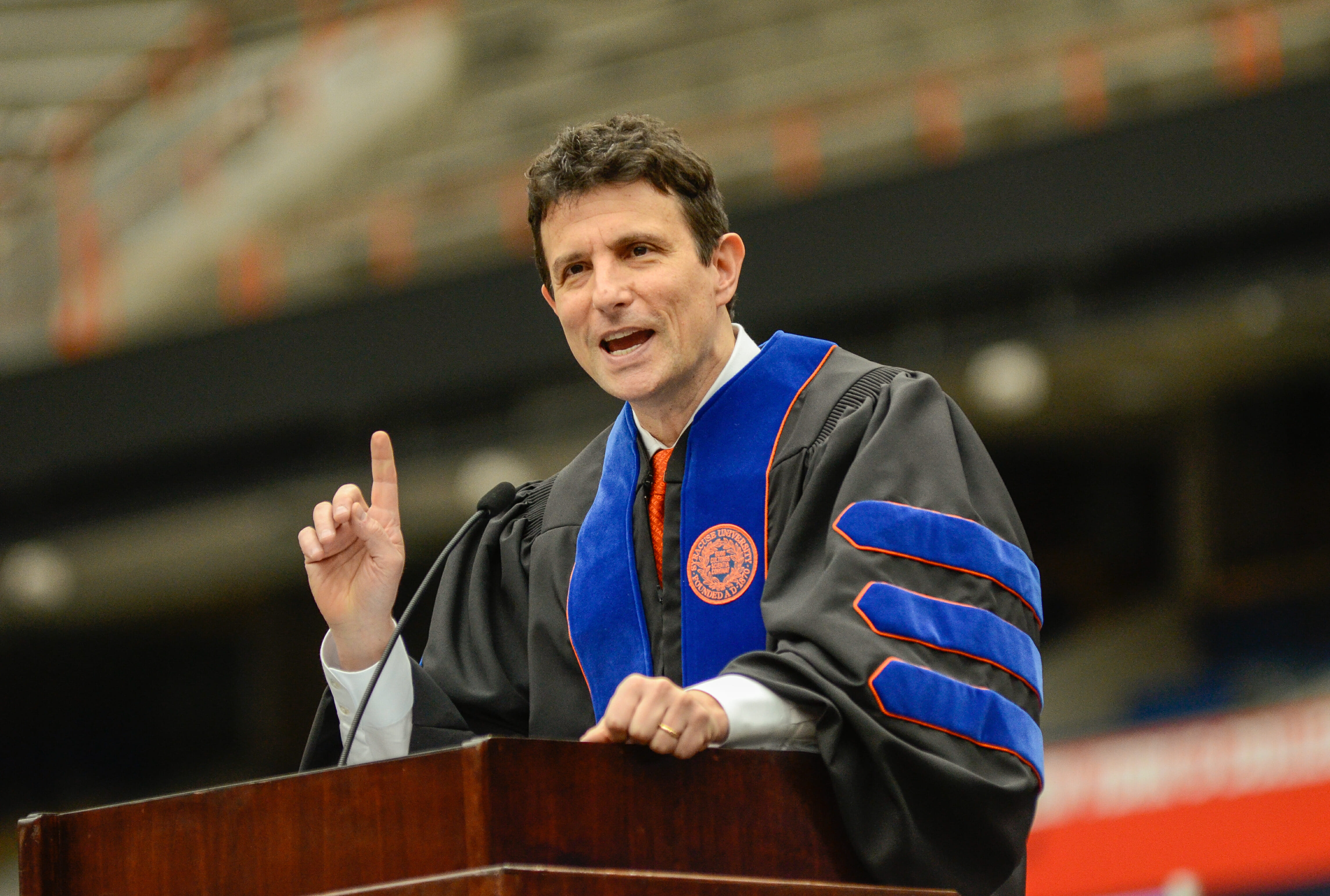Contemporary Liberalism’s Worst Idea Yet
David Remnick and his ilk believe they can interrogate fascism away. They’re only betraying their own nihilism. Editor of The New Yorker David Remnick delivers a commencement address at Syracuse University in 2014. (Heather Ainsworth / AP)
Editor of The New Yorker David Remnick delivers a commencement address at Syracuse University in 2014. (Heather Ainsworth / AP)
Ideas are dumb. Not ideas generally; people have good ones all the time. You probably have a few yourself. I mean Ideas, the product, often capitalized, wrapped individually like apples in an airport coffee shop, sold in books with one-word titles and in lecture series and at festivals. Ideas that are gawped at by the nouveau riche in Aspen and hoovered up by the wannabe nouveau riche at TED talks.
Ideas are the homeopathy of the mind. Through an infinite distillation of actual thought, we arrive at an overpriced bottle of water.
This weekend’s imbroglio is the perfect metaphor for the Ideas industry as a whole.
David Remnick is the editor of The New Yorker. He is most notable for his vociferous belief that George W. Bush—whom he assured us that he, David Remnick, understood to be an absolute idiot—nevertheless should have been given the green light to blow up Iraq. “The price of being wrong yet again could be incalculable,” he wrote at the time.
In a better world, we would carve these words on a placard and hang it around Remick’s neck, as a warning to those who may encounter him among the herds of migrating thought leaders. In this fallen one, he is still running a prestigious magazine and organizing popular symposiums. For this year’s New Yorker Festival, he invited, and was then forced to disinvite, Steve Bannon, the president’s former campaign manager and the most malignant pile of week-old polo shirts this side of a flood-damaged Brooks Brothers.
The invitation was as confounding as the disinvitation was inevitable. Surely Remick must have expected it? Bannon is a notorious white nationalist and narcissist, as well as a colossal bore. I suppose, in keeping with the general tenor of middlebrow intellectualism so prevalent at these sorts of confabs, the latter two qualities outweighed the first.
In all likelihood, Remnick did not actually anticipate the backlash. He may have genuinely believed that his genteel audience was unaware of one of the most profiled and interviewed political figures on the planet. And he may have really thought that if he assiduously peppered Bannon with how-dare-you-sirs, then Bannon would emerge diminished, and the audience elevated.
Remnick conducts weekly interviews on The New Yorker Radio Hour. I’ve listened to it on NPR. It’s a perfectly pleasant show. A crucible, it is not.
Bannon is a dummy himself, cunning and learned only in comparison to his foolish media interlocutors, who imagine that reading anything older or more complex than the latest Malcolm Gladwell tome makes a person some kind of scholar. His interviews are a mess; his ideas about history and philosophy are cribbed from the same three sources as the weird guy in your freshman dorm with the katanas on his wall and the Elvish inscription on his whiteboard.
Everyone on earth is familiar with his ideas, a wet omelet of Sun Tzu, Bartlett’s, and some half-remembered Will and Ariel Durant. We’re occasionally reminded that he’s heard of the fascist intellectual Julius Evola. So has every reactionary country-club Knight of Columbus who dreams of being inducted into Opus Dei. History dealt with Bannon’s “ideas” when it dumped their corpses in the Piazzale Loreto to be abused by a crowd. His political genius is likewise a figment; the half-century-old Southern Strategy defeated—barely, and only through quirks of America’s harebrained Constitution—an inept and deeply unpopular opponent.
But neither Remnick alone, nor The New Yorker nor its silly festival are wholly to blame here, since they are just a part of this broader ecosystem of self-congratulatory fatuity masquerading as inquiry and thought. It is a brainless ecumenicism that has convinced itself that ideology is extinct and that politics, the struggle for and application of power in society, is a sort of clever salon.
The indefatigably incorrect popularizer of the most counterintuitive ideas that mere common sense has already intuited, Malcolm Gladwell, regretfully tweeted in the wake of the whole fiasco: “If you only invite your friends over, it’s called a dinner party.” But to the Gladwells and Remnicks, that’s precisely what it is. Well, I have dinner parties with some frequency and fill them with all sorts of people with whom I disagree, but I have not yet invited the Nazi from the town down the river to share brisket and bring a dessert.
It points to contemporary liberalism’s fatal flaw. It has affect and etiquette but no content. It will disapprove if you use the wrong spoon, and it would not stand for hearing the N-word aloud, but it will politely ask Steve Bannon, or Richard Spencer if they really believe what they avowedly and publicly really believe. It still bleeps profanity, but it will permit an accessory to a murderous demonstration to literally list the “races” by relative intelligence on the air. The only thing that arouses its righteous fury and martial instinct is criticism of its own worst impulses. It howls with dismay when criticized for befriending its own executioners.
Ironically, what people like Remnick or Gladwell—or Jeffrey Goldberg, Remnick’s counterpart at The Atlantic, who waded into his own easily anticipated controversy by hiring an overt racist and misogynist in Kevin Williamson—absolutely cannot abide is being discomfited. They love the idea that censorious leftists should be shocked out of their complacency and insularity by the public promotion of actual, dyed-in-the-wool, by-God, 20th-century fascism, but one sarcastic tweet by an anonymous account with 60 followers can send them into days-long meltdowns about The Discourse.
They’re comfortable nihilists, and they just can’t believe that anyone—the leftists they sneer at or the violent authoritarians they accidentally promote—can believe anything at all.
Wrong yet again.
Your support matters…Independent journalism is under threat and overshadowed by heavily funded mainstream media.
You can help level the playing field. Become a member.
Your tax-deductible contribution keeps us digging beneath the headlines to give you thought-provoking, investigative reporting and analysis that unearths what's really happening- without compromise.
Give today to support our courageous, independent journalists.




You need to be a supporter to comment.
There are currently no responses to this article.
Be the first to respond.